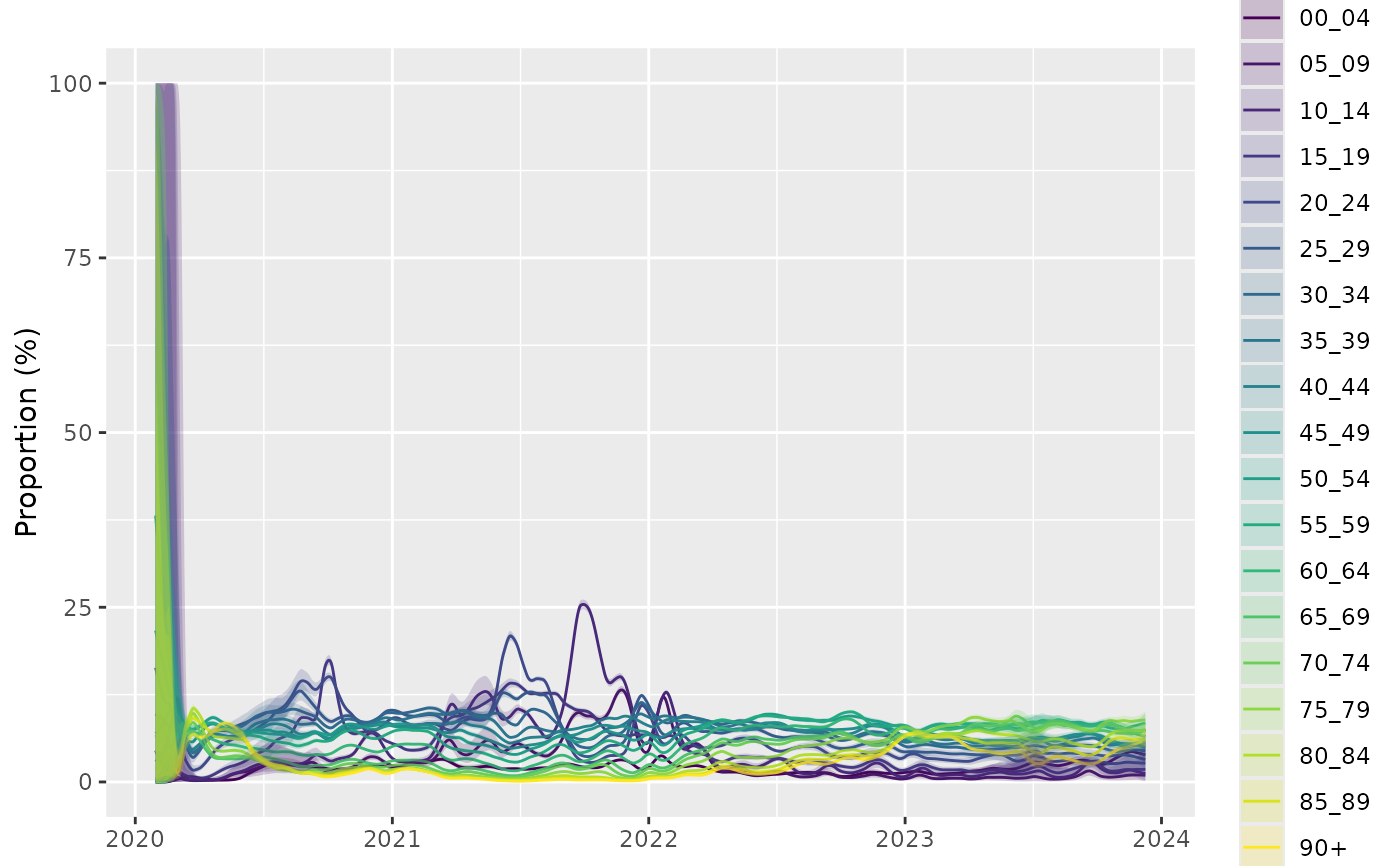Plot a proportions timeseries
Usage
plot_proportion(
modelled = i_proportion_model,
raw = i_proportion_data,
...,
mapping = if (interfacer::is_col_present(modelled, class)) ggplot2::aes(colour = class)
else ggplot2::aes(),
events = i_events
)Arguments
- modelled
Proportion model estimates
A dataframe containing the following columns:
time (as.time_period + group_unique) - A (usually complete) set of singular observations per unit time as a `time_period`
proportion.fit (double) - an estimate of the proportion on a logit scale
proportion.se.fit (double) - the standard error of proportion estimate on a logit scale
proportion.0.025 (proportion) - lower confidence limit of proportion (true scale)
proportion.0.5 (proportion) - median estimate of proportion (true scale)
proportion.0.975 (proportion) - upper confidence limit of proportion (true scale)
No mandatory groupings.
No default value.
- raw
Raw count data
A dataframe containing the following columns:
denom (positive_integer) - Total test counts associated with the specified timeframe
count (positive_integer) - Positive case counts associated with the specified timeframe
time (as.time_period + group_unique) - A (usually complete) set of singular observations per unit time as a `time_period`
No mandatory groupings.
No default value.
- ...
Arguments passed on to
geom_events,proportion_locfit_modelwindowa number of data points defining the bandwidth of the estimate, smaller values result in less smoothing, large value in more. The default value of 14 is calibrated for data provided on a daily frequency, with weekly data a lower value may be preferred. - (defaults to
14)degpolynomial degree (min 1) - higher degree results in less smoothing, lower values result in more smoothing. A degree of 1 is fitting a linear model piece wise. - (defaults to
1)frequencythe density of the output estimates as a time period such as
7 daysor2 weeks. - (defaults to"1 day")
- mapping
a
ggplot2::aesmapping. Most importantly setting thecolourto something if there are multiple incidence timeseries in the plot- events
Significant events or time spans
A dataframe containing the following columns:
label (character) - the event label
start (date) - the start date, or the date of the event
end (date) - the end date or NA if a single event
No mandatory groupings.
A default value is defined.
Examples
tmp = growthrates::england_covid %>%
growthrates::proportion_locfit_model(window=21) %>%
dplyr::glimpse()
#> Rows: 26,790
#> Columns: 12
#> Groups: class [19]
#> $ class <fct> 00_04, 00_04, 00_04, 00_04, 00_04, 00_04, 00_04…
#> $ time <time_prd> 0, 1, 2, 3, 4, 5, 6, 7, 8, 9, 10, 11, 12, …
#> $ proportion.fit <dbl> -13.433629, -13.178345, -12.898497, -12.600007,…
#> $ proportion.se.fit <dbl> 51.598289, 49.954079, 48.024633, 45.878749, 43.…
#> $ proportion.0.025 <dbl> 1.759164e-50, 5.698079e-49, 3.308357e-47, 2.991…
#> $ proportion.0.5 <dbl> 1.465037e-06, 1.891110e-06, 2.501801e-06, 3.371…
#> $ proportion.0.975 <dbl> 1.0000000, 1.0000000, 1.0000000, 1.0000000, 1.0…
#> $ relative.growth.fit <dbl> 0.24102860, 0.24048966, 0.23901181, 0.23680352,…
#> $ relative.growth.se.fit <dbl> 1.2309119, 1.2257057, 1.2114298, 1.1900979, 1.1…
#> $ relative.growth.0.025 <dbl> -2.1715143, -2.1618494, -2.1353470, -2.0957455,…
#> $ relative.growth.0.5 <dbl> 0.24102860, 0.24048966, 0.23901181, 0.23680352,…
#> $ relative.growth.0.975 <dbl> 2.6535715, 2.6428288, 2.6133706, 2.5693525, 2.5…
plot_proportion(tmp)+
ggplot2::scale_fill_viridis_d(aesthetics = c("fill","colour"))
